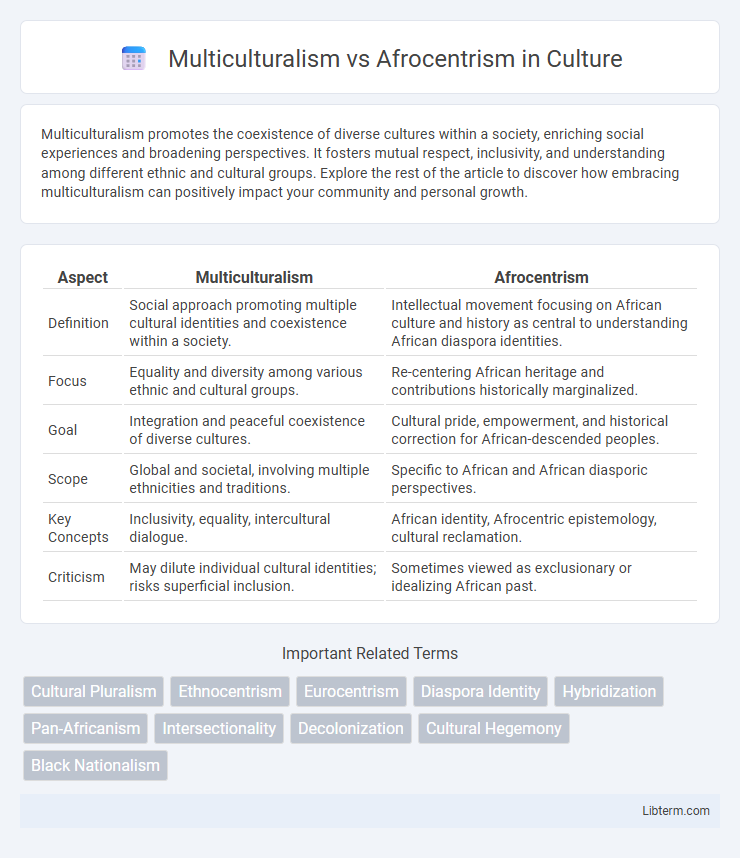Multiculturalism promotes the coexistence of diverse cultures within a society, enriching social experiences and broadening perspectives. It fosters mutual respect, inclusivity, and understanding among different ethnic and cultural groups. Explore the rest of the article to discover how embracing multiculturalism can positively impact your community and personal growth.
Table of Comparison
| Aspect | Multiculturalism | Afrocentrism |
|---|---|---|
| Definition | Social approach promoting multiple cultural identities and coexistence within a society. | Intellectual movement focusing on African culture and history as central to understanding African diaspora identities. |
| Focus | Equality and diversity among various ethnic and cultural groups. | Re-centering African heritage and contributions historically marginalized. |
| Goal | Integration and peaceful coexistence of diverse cultures. | Cultural pride, empowerment, and historical correction for African-descended peoples. |
| Scope | Global and societal, involving multiple ethnicities and traditions. | Specific to African and African diasporic perspectives. |
| Key Concepts | Inclusivity, equality, intercultural dialogue. | African identity, Afrocentric epistemology, cultural reclamation. |
| Criticism | May dilute individual cultural identities; risks superficial inclusion. | Sometimes viewed as exclusionary or idealizing African past. |
Understanding Multiculturalism: Core Principles
Multiculturalism emphasizes the coexistence of diverse cultural identities within a society, promoting equal respect and inclusion for all ethnic groups. Core principles include cultural pluralism, social equity, and the recognition of the unique contributions of each community to the social fabric. In contrast, Afrocentrism centers African heritage and perspectives, aiming to reclaim African identity and counter Eurocentric narratives.
Defining Afrocentrism: Origins and Philosophy
Afrocentrism is an intellectual and cultural movement that centers African history and values as the foundation for interpreting African diaspora experiences and contributions. Originating in the late 20th century, Afrocentrism challenges Eurocentric narratives by emphasizing African agency, identity, and heritage in historical and contemporary contexts. Its philosophy advocates for reclaiming African spirituality, knowledge systems, and cultural pride to counter systemic marginalization and promote empowerment within the global African community.
Historical Context: Roots of Multiculturalism and Afrocentrism
Multiculturalism emerged in the mid-20th century as a response to increasing cultural diversity in Western societies, promoting the coexistence and equal respect of various ethnic groups within a pluralistic framework. Afrocentrism arose as a scholarly and cultural movement in the late 20th century, challenging Eurocentric historical narratives and emphasizing the centrality of African history and contributions to global civilization. Both movements address identity and representation but stem from differing historical experiences: multiculturalism from post-colonial immigration dynamics and Afrocentrism from the legacy of African diaspora and resistance to racial marginalization.
Educational Approaches: Integrating Diverse Perspectives
Multiculturalism in education promotes the inclusion of multiple cultural narratives and perspectives, emphasizing equal representation and respect for all cultural backgrounds. Afrocentrism centers African history, culture, and contributions as a corrective to Eurocentric curricula, aiming to empower students of African descent through culturally relevant pedagogy. Integrating diverse perspectives involves balancing these approaches to foster a comprehensive, inclusive learning environment that values both global interconnectedness and the specific historical experiences of marginalized groups.
Representation in Media and Arts
Representation in media and arts reveals contrasting approaches between multiculturalism and Afrocentrism, where multiculturalism promotes diverse cultural narratives within a shared framework, ensuring visibility of multiple ethnic groups, while Afrocentrism centers Black cultural experiences and histories to counteract Eurocentric dominance. Media grounded in Afrocentric perspectives highlights African heritage and fosters empowerment through authentic storytelling, challenging stereotypical depictions prevalent in mainstream platforms. The tension between these paradigms influences how racial identity and cultural authenticity are negotiated in visual arts, film, and literature, impacting societal perceptions and inclusion policies.
Social Cohesion vs. Cultural Identity
Multiculturalism promotes social cohesion by encouraging diverse groups to coexist and interact within a shared society, fostering mutual respect and understanding across cultural boundaries. Afrocentrism emphasizes cultural identity by centering African heritage and perspectives, reinforcing pride and unity within the African diaspora. Balancing these approaches involves nurturing inclusive social policies that recognize unique cultural identities while maintaining collective societal harmony.
Policy Implications: Government and Institutional Responses
Government policies on multiculturalism typically emphasize inclusive diversity and equal representation across ethnic groups, promoting social cohesion through pluralistic frameworks. In contrast, Afrocentrism influences policy by centering African heritage and experiences, advocating for education reform and institutional changes that address historical injustices and systemic racism affecting African diasporic communities. Institutional responses to multiculturalism often involve broad diversity initiatives, while Afrocentric approaches push for targeted resource allocation and curriculum changes that prioritize African cultural perspectives and empowerment.
Criticisms and Controversies
Criticisms of multiculturalism focus on claims it can lead to social fragmentation and weaken national identity by emphasizing cultural differences. Afrocentrism faces controversy for promoting a historical narrative that some scholars argue overemphasizes African contributions at the expense of other perspectives, leading to debates on academic rigor and historical accuracy. Both frameworks encounter challenges in balancing cultural pride with inclusive dialogue in diverse societies.
Case Studies: Real-World Applications and Outcomes
Multiculturalism promotes the coexistence of diverse cultural identities within a society, as seen in Canada's policy fostering inclusive social cohesion and intercultural dialogue. Afrocentrism centers African history and cultural perspectives, exemplified by initiatives like Kenya's education reforms integrating indigenous knowledge systems to enhance national identity and empowerment. Comparative case studies reveal multiculturalism often emphasizes integration and diversity management, while Afrocentrism actively reclaims African heritage to challenge Eurocentric narratives and promote cultural self-determination.
The Future of Cultural Discourse: Towards Reconciliation
Multiculturalism promotes the coexistence of diverse cultural identities within a society, emphasizing inclusivity and mutual respect, while Afrocentrism centers African heritage and perspectives as a means of reclaiming historical narratives and fostering black empowerment. The future of cultural discourse calls for reconciliation through dialogue that honors both pluralism and the rectification of historical injustices, facilitating a balanced understanding of identity and belonging. Embracing this synthesis can advance social cohesion by recognizing cultural specificity alongside shared human values.
Multiculturalism Infographic

 libterm.com
libterm.com